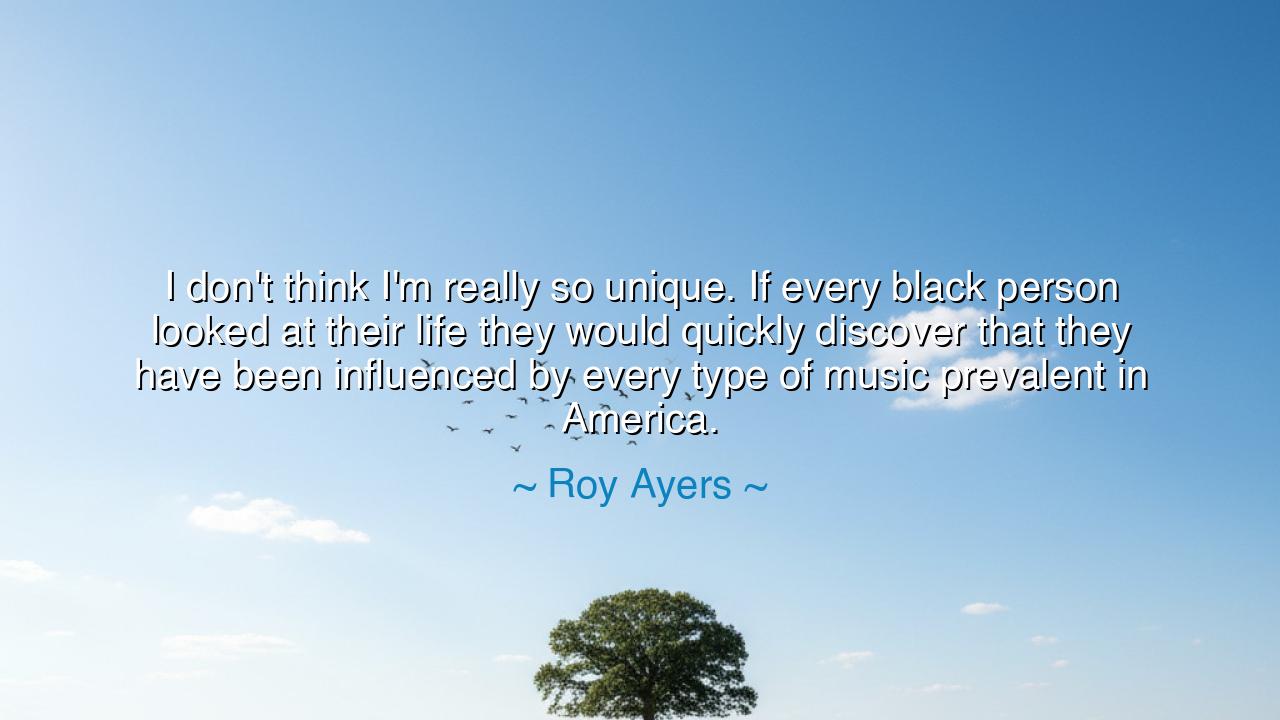
I don't think I'm really so unique. If every black person looked
I don't think I'm really so unique. If every black person looked at their life they would quickly discover that they have been influenced by every type of music prevalent in America.






Hear the words of Roy Ayers, master of rhythm and voice of a generation: “I don’t think I’m really so unique. If every black person looked at their life they would quickly discover that they have been influenced by every type of music prevalent in America.” This saying is not one of modesty alone, but of profound truth, woven with history, sorrow, joy, and resilience. In it resounds the story of a people, and the testament that the soul of a culture is not built in solitude, but in the embrace of many sounds, many struggles, many triumphs.
For music has ever been the mirror of the human heart, and in America, the black spirit has been its beating drum. From the sorrowful wail of the blues, born upon the fields of toil, to the exalted cry of gospel, rising like fire in the churches, from the defiant shout of jazz, to the rebel voice of hip-hop, all these are threads of one grand tapestry. Ayers teaches us that no man may say, “I am untouched by the world around me.” Instead, each life is like a river that gathers waters from many streams. To deny this is to deny the richness of the journey.
Consider the story of Louis Armstrong, who as a boy grew up in poverty in New Orleans, a city bursting with ragtime, marching bands, hymns, and blues. He carried a battered cornet, and out of those many influences, he forged a sound that changed the world. Was it born from a single source? No, it was the blending of every melody he had heard—the church choirs, the street parades, the cries of the vendors. Like Roy Ayers, Armstrong was not “unique” in isolation, but unique because he allowed all the voices of America to speak through him.
So too with Aretha Franklin, the Queen of Soul, who grew up surrounded by gospel in her father’s church, yet carried into her songs the rhythms of jazz, the passion of blues, the fight of freedom songs. Each note she sang bore the imprint of generations, of a people shaped by every sound that crossed their path. Her greatness was not apart from influence, but born of it—just as Ayers declares: the black experience in America is the sum of all its musics, each style an echo of survival, resilience, and boundless creativity.
Thus, the lesson is revealed: we are not made lesser because we are influenced, but greater. Influence is not weakness, it is power. Just as steel is forged by the meeting of fire and hammer, so is the spirit shaped by all it encounters. To embrace this truth is to honor the fullness of one’s story. To deny it is to cut away the roots that give strength.
What then shall we do, O children of tomorrow? First, look within your own life. Ask not, “Am I original?” but “What has shaped me?” Cherish those voices, those songs, those traditions that live within you, for they are the stones upon which your house is built. Do not despise the influences that have made you; instead, transform them into something that bears your own fire, as Ayers did with his vibraphone, as countless black artists did when they turned pain into beauty.
Practically, this means to listen widely, to honor the past, to allow yourself to be touched by cultures, ideas, and experiences beyond your own. Let the gospel of compassion mix with the jazz of curiosity, the blues of endurance with the hip-hop of defiance. Then, from this symphony of influences, create your own melody. In this way, you will not be a copy of others, but a vessel of many voices, made radiant by your own spirit.
So let us remember: uniqueness is not isolation, but transformation. Roy Ayers, in humility, reminds us that greatness does not spring from standing apart, but from standing within the river of life and letting its many currents shape us. If we too walk this path, then like the ancients who sang by firelight, our voices shall carry forward into the ages, not as echoes of pride, but as harmonies of truth.






AAdministratorAdministrator
Welcome, honored guests. Please leave a comment, we will respond soon